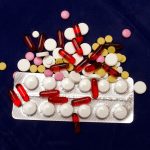Drugs To Avoid With Shellfish Allergy

A drug-food interaction occurs when the food you eat interacts with a medication you are taking, affecting the way the medication works in your body. Certain foods can either enhance or reduce the absorption and effectiveness of a medication or cause side effects when taken with certain drugs.
Some foods can interact with medications and affect their absorption, distribution, metabolism, and excretion in the body. The extent of the interaction can vary depending on the type of medication and the amount and timing of the food consumed.
According to studies, approximately 70% of Americans take at least one prescription medication, and many of these medications have the potential to interact with food. Some medications are known to have specific food interactions, while others may have interactions that are less well understood.
It is important to be aware of potential drug-food interactions, especially if you are taking multiple medications or have certain health conditions.
What is Shellfish allergy?
Shellfish allergy is a type of food allergy that occurs when the immune system reacts to proteins found in certain types of shellfish. Shellfish are divided into two categories: crustaceans and mollusks. Crustaceans include shrimp, crab, and lobster, while mollusks include oysters, clams, and mussels.
Symptoms of a shellfish allergy can range from mild to severe and can include:
- Hives, itching, or eczema
- Swelling of the lips, face, tongue, and throat
- Shortness of breath or wheezing
- Abdominal pain, nausea, vomiting, or diarrhea
- Dizziness or lightheadedness
- Anaphylaxis, a severe and potentially life-threatening reaction that can cause difficulty breathing, a drop in blood pressure, and loss of consciousness.
Shellfish allergy is relatively common, especially in adults. According to studies, shellfish allergy affects approximately 2.3% of adults in the United States. It is less common in children, affecting approximately 0.5% of children in the United States.
Shellfish allergy can develop at any age, but it is more likely to develop in adults than in children. People with a family history of allergies, including food allergies, are also at a higher risk of developing a shellfish allergy.
It is important to note that having an allergy to one type of shellfish, such as shrimp or crab, does not necessarily mean that a person is allergic to all types of shellfish. Some people may only be allergic to one type, while others may be allergic to multiple types of shellfish.
What is medication-induced shellfish allergy?
Medication-induced shellfish allergy occurs when a person develops an allergic reaction to a medication that contains proteins or other substances derived from shellfish. This can happen even if the person has never had a previous allergic reaction to shellfish.
Drugs To Avoid With Shellfish Allergy
If you have a shellfish allergy, it is important to be aware of certain medications that may contain shellfish-derived ingredients or have the potential to cross-react with shellfish allergens. Some medications to avoid or use with caution if you have a shellfish allergy include:
1. Glucosamine and Chondroitin – These dietary supplements are often derived from shellfish, and can cause allergic reactions in people with shellfish allergy. If you have a shellfish allergy, it is important to read the labels of any dietary supplements you take and avoid those that contain glucosamine or chondroitin like Osteoeze Gold, Marinas Mega-Herb, and Tamiflex.
2. Iodine-Based Contrast Agents – These are used for certain imaging tests, such as CT scans and X-rays, and can be derived from shellfish. However, iodine is not the allergen in shellfish that triggers an allergic reaction. Therefore, people with shellfish allergy are not at an increased risk of an allergic reaction to these contrast agents. However, if you have a history of severe allergic reactions to shellfish or other allergens, your healthcare provider may still take precautions or use alternative imaging tests.
3. Vaccines – Some vaccines, such as the flu vaccine and the yellow fever vaccine, are grown in eggs or egg products. However, they do not contain shellfish or shellfish-derived ingredients. People with shellfish allergy can receive these vaccines safely unless they have an allergy to eggs or any other component of the vaccine.
4. Calcium Supplements – Some calcium supplements are derived from oyster shells, and may cause an allergic reaction in people with shellfish allergy. If you have a shellfish allergy, it is important to read the labels of any calcium supplements you take and avoid those that contain oyster shell calcium.
5. Seafood-Based Nutritional Supplements – Some nutritional supplements, such as omega-3 fatty acids or fish oil supplements, may be derived from seafood, including shellfish. It is important to read the labels of any nutritional supplements you take and avoid those that contain shellfish-derived ingredients.
6. Asthma Medications – Some asthma medications, such as leukotriene modifiers, contain gelatin, which may be derived from shellfish. If you have a shellfish allergy, it is important to discuss the use of these medications with your healthcare provider, as alternative medications may be available.
7. Probiotics – Some probiotic supplements may contain shellfish-derived ingredients, such as chitin. If you have a shellfish allergy, it is important to read the labels of any probiotic supplements you take and avoid those that contain shellfish-derived ingredients.
It is important to note that these medications and supplements may not cause an allergic reaction in all people with shellfish allergy, as the severity of the allergy can vary from person to person.
However, it is important to discuss any potential risks with your healthcare provider, especially if you have a history of severe allergic reactions. In addition, if you experience any symptoms of an allergic reaction after taking a medication or supplement, seek medical attention immediately.
How to Prevent Medication-Induced Shellfish Allergy
If you have a shellfish allergy, it is important to take steps to prevent medication-induced shellfish allergy. Here are some tips to help prevent this type of allergy:
- Inform your healthcare providers: Make sure that all of your healthcare providers, including your primary care doctor, pharmacist, and any specialists you see, are aware of your shellfish allergy. This will help them to avoid prescribing medications that may contain shellfish-derived ingredients or have the potential to cross-react with shellfish allergens.
- Read medication labels carefully: Always read the labels of any medications you take, including over-the-counter medications and supplements. Look for any warnings about shellfish-derived ingredients or cross-reactivity with shellfish allergens.
- Ask your pharmacist: If you are unsure about whether a medication contains shellfish-derived ingredients or has the potential to cross-react with shellfish allergens, ask your pharmacist. They can provide information on the ingredients and potential risks.
- Carry an epinephrine auto-injector: If you have a severe shellfish allergy, it is important to carry an epinephrine auto-injector with you at all times in case of an allergic reaction.
- Consider medical alert jewelry: Wearing a medical alert bracelet or necklace can alert others to your shellfish allergy in case of an emergency.
By taking these steps, you can help to reduce your risk of medication-induced shellfish allergy and better manage your shellfish allergy overall.





